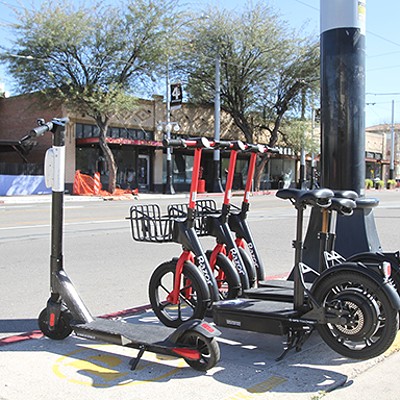DEMOCRATIC POLL: ROTHSCHILD LEADS GRINNELL BY 17
Just ahead of the big mayor and council forum on Monday, Oct. 17 (which you can read more about on Page 14), Pima County Democratic Party chairman Jeff Rogers released a poll by Global Strategy Group showing that Democrat Jonathan Rothschild led Republican Rick Grinnell by 17 percentage points.
The survey, done Oct. 10-12, showed that 49 percent of 400 likely voters back Rothschild, while 32 percent support Grinnell, and 4 percent support Green Mary DeCamp. The survey had a margin of error of 5 percent.
"I'm pleased," Rogers says. "Seventeen points is a good lead."
Rogers notes that there are still undecided voters out there, but an August poll had shown that Rothschild had the support of 40 percent of voters, while Grinnell was backed by 24 percent. Rogers' takeaway: Undecided voters are breaking in equal numbers for the two candidates, and Rothschild is maintaining a consistent lead.
Rogers also notes that the survey shows that within the city of Tucson, 54 percent of those surveyed had a favorable view of the Democratic Party, while 37 percent had an unfavorable view. Voters had a nearly opposite perspective on the Republican Party, with 39 percent viewing the GOP favorably, and 53 percent viewing it unfavorably.
At Monday night's forum, Grinnell said he hadn't seen the poll.
"The only poll I'm counting is Nov. 8," Grinnell said.
On Tuesday, Oct. 18, the Democratic Party released polling showing that the Democratic City Council members have even bigger leads than Rothschild. Shirley Scott led Tyler Vogt by 25 points (53 percent to 28 percent); Paul Cunningham led Jennifer Rawson by 29 points (54 percent to 25 percent); and Regina Romero led Green Beryl Baker by 32 points (49 percent to 17 percent).
It's hard to predict which voters are going to cast a ballot in the November election. Normally, city elections, which are held in odd years, see turnout in the range of 25 to 40 percent, which is considerably lower than turnout in presidential or gubernatorial contests.
As we've noted in the past, that's been one of the main reasons why Republicans have had so much success in city elections, despite being outnumbered by Democrats: Turnout in eastside precincts, where more Republicans live, tends to be much higher than turnout on the south and west sides, where more Democrats live.
But for the first time this year, every voter in the city of Tucson will receive a ballot in the mail, which could lead to a much-higher turnout. (The vote-by-mail program significantly boosted participation in the August primary.)
Rogers anticipates that a higher turnout will benefit Democrats.
"The trend toward more people voting helps us more than hurts us, so the late-breaking trends may be even better for us, because we're expecting a rather extraordinary turnout because of the vote-by-mail," Rogers says.
He tells The Skinny that the survey contacted high-propensity voters.
"We looked at people who vote in nearly every election," Rogers says. "And even if they did vote in every election, we screened them, and if they said that maybe they'd vote, we stopped the poll. It's a much-stricter model than we're probably going to see in the voter breakdown."
The Democratic leads in the poll strike us as pretty massive, even if Tucson is a Democratic town.
Republican operatives have been touting much-closer races, and we hear a storm is gathering, with business leaders now contributing money to the Arizona Republican Party with the intent of running a hard negative campaign against the Democratic candidates that will largely focus on the Rio Nuevo downtown redevelopment program, and the subsequent FBI and state attorney general investigations, which remain ongoing.
PAPER CHASE
Two of the three Republican candidates for mayor and council are still waiting for their funds from the city of Tucson.
To qualify for a dollar-to-dollar match, City Council candidates must collect a minimum of 200 contributions of at least $10 from city residents; the threshold for mayoral candidates is 300 contributions.
Ward 4 Republican Tyler Vogt is the only GOP candidate to have qualified for the matching funds as of this week. Vogt, who is hoping to unseat Democrat Shirley Scott, had raised $82,379, including $44,910 in matching funds, according to a report filed last week. (We're pretty sure Vogt made a mistake somewhere, seeing as it's not possible to have more in matching funds than contributions, but that's what the report says.)
The Pima County Democratic Party sent out a bulletin earlier this week complaining that GOP mayoral candidate Rick Grinnell had failed to meet the 300-contribution threshold, because 69 of his contributors had either been counted twice or lived outside of the city limits.
"It shows you how incompetent he is," says Jeff Rogers, the chairman of the Pima County Democratic Party. "He had people like Bruce Ash and Jim Click listed as city residents."
Suzanne Mesich of the Tucson City Clerk's Office, which has the job of auditing the requests for matching funds, says that the city is still looking over Grinnell's application for matching funds.
Mesich says it could take another week or two to complete the audit, but Team Grinnell is continuing to deliver new reports with additional contributors, which could help him over the threshold if he had indeed fallen short.
Grinnell's most recent report showed that he had raised $54,544.
Mesich says the city is also still going over Republican Jennifer Rawson's application for matching funds, a process that could also take as long as two more weeks to complete. Rawson is facing Democrat Paul Cunningham in Ward 2.
New reports are due this week.
MAYORAL MELEE
If you haven't caught one of the mayoral debates yet, you have another chance this Friday, Oct. 21, when the three candidates—Democrat Jonathan Rothschild, Republican Rick Grinnell and Green Mary DeCamp—will meet for an hour on Bill Buckmaster's eponymous radio show.
The Buckmaster Show airs Monday through Friday at noon on KVOI AM 1030.
CRAZY CHARGES
Republican presidential hopefuls Herman Cain and Michele Bachmann blew through Phoenix earlier this week to share their dumb ideas about securing the border.
Bachmann appeared with several state lawmakers, including embattled Senate President Russell Pearce, to praise them for their efforts to build a border wall with donated funds.
Bachmann's visit followed a declaration that she would build a wall along every inch of the border—which shows that she doesn't understand anything about border geography or the cost of fence construction.
Cain, meanwhile, sort of backtracked from his own proposal to build an electrified fence along the border. He first told the press that he was only joking, but in a later news conference with Maricopa County Sheriff Joe Arpaio, he said it might not be such a bad idea.
The Associated Press reported that Cain said his proposed fence "might be electrified. I'm not walking away from that. I just don't want to offend anyone."
Let us say that the idea of an electrified fence that would kill people—not to mention wildlife—strikes us as a very dumb idea.















